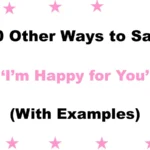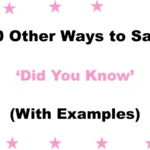Finding the right words to confirm plans can transform a routine check-in into a warm, thoughtful interaction. Whether you’re touching base with a friend, colleague, or client, choosing an alternative to “Are we still on?” can add a personal touch and show you truly care.
In this article, you’ll discover 30 empathetic and conversational alternatives—complete with definitions, explanations, examples, and tips for best and worst uses. Let’s make your messages feel more meaningful and leave a positive impression every time.
What Does “Are We Still On?” Mean?
The phrase “Are we still on?” is a casual way to ask if a planned event or meeting is still happening as expected. It’s often used to confirm whether both parties are still available and committed to the plan. While short and simple, this question carries a layer of uncertainty—you’re gently checking in without assuming the other person remembers or is still available. It’s commonly used in both personal and professional settings and shows that you’re being respectful of someone’s time while also seeking clarity and confirmation.
When to Use “Are We Still On?”
- Last-minute checks before a meeting or event
- Busy schedules when confirmations may slip through
- Casual plans with friends or acquaintances
Use it when you need a friendly nudge without sounding demanding.
Is It Professional/Polite to Say “Are We Still On?”
Yes, “Are we still on?” is generally considered polite and acceptable, especially in informal or semi-formal settings. However, in strictly professional environments—like corporate emails or meetings with clients—this phrase might come across as too casual. In such cases, it’s often better to use a more formal alternative, such as “Just checking to confirm our meeting” or “Are we still scheduled for today?”. ‘
That said, when used with the right tone and audience, “Are we still on?” can still sound friendly, respectful, and to the point. The key is to match your language to the context and your relationship with the other person.
Pros and Cons of “Are We Still On?”
Pros:
- Quick and direct
- Shows you care about the plan
Cons:
- Can sound abrupt if overused
- Lacks personal warmth in more distant relationships
Synonyms for “Are We Still On?”
- Is our plan still a go?
- Just checking we’re still set?
- Can you confirm we’re proceeding?
- Are we good for [day/time]?
- Still happening on your end?
- Wanted to make sure we’re meeting.
- Touching base about our appointment.
- Looking forward—are we on?
- Are we all systems go?
- Are we locked in for [day]?
- Is everything a go for [event]?
- Quick confirmation for our meetup.
- Are we moving forward as planned?
- All set for [time]?
- Are we lined up for [date]?
- Just verifying our plans.
- Do we still have a date?
- Are we still scheduled?
- Shall we go ahead as discussed?
- Can I count on you for [time]?
- Are we proceeding with our plan?
- Still on for [activity]?
- Are we confirmed for [event]?
- Ready to roll at [time]?
- Are we locked and loaded for [date]?
- Is our rendezvous still on?
- Confirming our engagement for [day].
- All systems ready for [time]?
- Just touching base—are we on?
- Shall we stick to our plan?
1. Is our plan still a go?
Definition: A friendly way to confirm if the agreed plan remains.
Explanation: Emphasizes the plan itself, rather than just the time.
Example: “Hey Sara, is our plan still a go for Saturday brunch?”
Best Use: Casual to semi-formal settings when you’ve made a clear plan.
Worst Use: Ultra-formal contexts (e.g., with senior executives).
Tone: Warm, proactive, considerate.
2. Just checking we’re still set?
Definition: A gentle nudge to ensure the meeting is on track.
Explanation: “Still set” conveys readiness and anticipation.
Example: “Morning, Tom—just checking we’re still set for our 3 PM call.”
Best Use: Friendly professional interactions.
Worst Use: With strangers—it can feel too familiar.
Tone: Casual, upbeat, courteous.
3. Can you confirm we’re proceeding?
Definition: A slightly formal request for confirmation.
Explanation: Uses “proceeding” to sound more business-like.
Example: “Hi Dr. Lee, can you confirm we’re proceeding with tomorrow’s session?”
Best Use: Professional emails or messages.
Worst Use: Informal chats—might feel stiff.
Tone: Polite, straightforward, respectful.
4. Are we good for [day/time]?
Definition: A concise way to double-check schedule details.
Explanation: “Are we good” implies everything is in order.
Example: “Hey Jen, are we good for Thursday at 2 PM?”
Best Use: Informal to semi-formal.
Worst Use: Over texting someone you rarely talk to.
Tone: Friendly, clear, efficient.
5. Still happening on your end?
Definition: Checks if any conflicts have arisen.
Explanation: Puts the focus on the other party’s situation.
Example: “Morning! Still happening on your end for the site visit?”
Best Use: Collaborative projects or plans.
Worst Use: When you haven’t set a concrete plan.
Tone: Empathetic, collaborative, casual.
6. Wanted to make sure we’re meeting.
Definition: Shows intentionality behind the check-in.
Explanation: “Wanted to make sure” feels thoughtful.
Example: “Hi Alex, I wanted to make sure we’re meeting at 10 AM tomorrow.”
Best Use: To emphasize reliability.
Worst Use: If overused, it can seem needy.
Tone: Thoughtful, reliable, sincere.
7. Touching base about our appointment.
Definition: A professional yet warm follow-up.
Explanation: “Touching base” is idiomatic for checking in.
Example: “Good afternoon, touching base about our appointment on Friday.”
Best Use: Client or vendor communications.
Worst Use: Too formal for close friends.
Tone: Polished, considerate, courteous.
8. Looking forward—are we on?
Definition: Expresses enthusiasm while confirming.
Explanation: “Looking forward” adds positivity.
Example: “Hi Maria, looking forward to our chat—are we on?”
Best Use: Friendly business or personal settings.
Worst Use: If you haven’t set a time, it can be confusing.
Tone: Enthusiastic, friendly, optimistic.
9. Are we all systems go?
Definition: A playful, energetic check-in.
Explanation: Borrowed from tech jargon (“all systems go”).
Example: “Team, are we all systems for Monday’s launch?”
Best Use: Creative or team environments.
Worst Use: Very formal industries (e.g., legal).
Tone: Lively, team-oriented, spirited.
10. Are we locked in for [day]?
Definition: Confirms commitment to the date.
Explanation: “Locked in” suggests firmness.
Example: “Hey—are we locked in for our road trip next Saturday?”
Best Use: Plans requiring firm commitment.
Worst Use: Casual hangouts—it can seem too serious.
Tone: Decisive, committed, clear.
11. Is everything a go for [event]?
Definition: Checks readiness for a specific event.
Explanation: “Everything a go” covers all details implicitly.
Example: “Morning! Is everything a go for tonight’s webinar?”
Best Use: Events or group activities.
Worst Use: One-on-one casual plans.
Tone: Inclusive, detail-oriented, upbeat.
12. Quick confirmation for our meetup.
Definition: Signals brevity and purpose.
Explanation: “Quick confirmation” respects time.
Example: “Hi—quick confirmation for our meetup at 5 PM?”
Best Use: Busy professionals.
Worst Use: Social chats—it feels transactional.
Tone: Efficient, respectful, concise.
13. Are we moving forward as planned?
Definition: Affirms progress on a plan.
Explanation: “Moving forward” sounds proactive.
Example: “Team, are we moving forward as planned with the proposal?”
Best Use: Project teams and collaborations.
Worst Use: Informal personal plans.
Tone: Proactive, professional, purposeful.
14. All set for [time]?
Definition: Simplifies the check to readiness.
Explanation: “All set” is a casual readiness check.
Example: “All set for our coffee chat at 11?”
Best Use: Friends and colleagues alike.
Worst Use: Formal invites—too casual.
Tone: Casual, straightforward, friendly.
15. Are we lined up for [date]?
Definition: Uses “lined up” to imply organization.
Explanation: Suggests a schedule is in place.
Example: “Hi Susan, are we lined up for June 2nd?”
Best Use: Scheduling meetings or appointments.
Worst Use: Loose weekend plans.
Tone: Organized, polite, clear.
16. Just verifying our plans.
Definition: A simple, direct check.
Explanation: “Verifying” sounds precise.
Example: “Hi John—just verifying our plans for tomorrow.”
Best Use: When details matter.
Worst Use: Over cocktails—it’s too formal.
Tone: Direct, precise, professional.
17. Do we still have a date?
Definition: Checks if the appointment is still scheduled.
Explanation: “Have a date” is slightly playful.
Example: “Morning—do we still have a date for the museum visit?”
Best Use: Social plans.
Worst Use: Work meetings—it’s too casual.
Tone: Playful, friendly, informal.
18. Are we still scheduled?
Definition: A neutral, factual inquiry.
Explanation: Focuses purely on the schedule.
Example: “Hello—are we still scheduled for our review?”
Best Use: Formal to semi-formal.
Worst Use: Close friends—it lacks warmth.
Tone: Neutral, factual, polite.
19. Shall we go ahead as discussed?
Definition: Invites final confirmation.
Explanation: “Go ahead” implies action.
Example: “Shall we go ahead as discussed for the site tour?”
Best Use: Business contexts.
Worst Use: Casual brunch invites.
Tone: Formal, courteous, action-oriented.
20. Can I count on you for [time]?
Definition: Emphasizes reliance.
Explanation: “Count on you” shows trust.
Example: “Can I count on you for our call at 3 PM?”
Best Use: Team projects.
Worst Use: Non-committal social plans.
Tone: Trusting, respectful, earnest.
21. Are we proceeding with our plan?
Definition: Asks about moving forward.
Explanation: Similar to #13 but more formal.
Example: “Are we proceeding with our plan to launch next week?”
Best Use: Strategic discussions.
Worst Use: Casual chats.
Tone: Formal, decisive, strategic.
22. Still on for [activity]?
Definition: Casual check for a specific activity.
Explanation: “Still on” is direct yet informal.
Example: “Still on for tennis this afternoon?”
Best Use: Friends and informal partners.
Worst Use: Boss-employee settings.
Tone: Casual, friendly, upbeat.
23. Are we confirmed for [event]?
Definition: Focuses on confirmation.
Explanation: “Confirmed” adds assurance.
Example: “Are we confirmed for next Wednesday’s workshop?”
Best Use: Workshops or seminars.
Worst Use: Last-minute dinners.
Tone: Assured, polite, professional.
24. Ready to roll at [time]?
Definition: Playful, energetic readiness check.
Explanation: “Ready to roll” implies eagerness.
Example: “Ready to roll at 9 AM for the hike?”
Best Use: Creative or informal outings.
Worst Use: Formal meetings.
Tone: Energetic, fun, lively.
25. Are we locked and loaded for [date]?
Definition: Very playful, almost military-style confirmation.
Explanation: “Locked and loaded” is highly energetic.
Example: “Team—are we locked and loaded for the presentation on Monday?”
Best Use: High-energy teams.
Worst Use: Sensitive or solemn events.
Tone: Bold, spirited, dynamic.
26. Is our rendezvous still on?
Definition: Slightly romantic or playful.
Explanation: “Rendezvous” adds flair.
Example: “Is our rendezvous still on for dinner Saturday?”
Best Use: Romantic or playful contexts.
Worst Use: Business meetings.
Tone: Flirty, charming, playful.
27. Confirming our engagement for [day].
Definition: Formal confirmation of commitment.
Explanation: “Engagement” sounds official.
Example: “Confirming our engagement for May 28th meeting.”
Best Use: Formal events.
Worst Use: Casual coffee dates.
Tone: Formal, official, precise.
28. All systems ready for [time]?
Definition: Tech-inspired readiness check.
Explanation: Conveys thorough preparation.
Example: “All systems ready for our workshop at 2 PM?”
Best Use: Tech or operations teams.
Worst Use: Informal invites.
Tone: Technical, prepared, confident.
29. Just touching base—are we on?
Definition: Warm, idiomatic check-in.
Explanation: “Touching base” is friendly and professional.
Example: “Just touching base—are we on for Friday at noon?”
Best Use: Client follow-ups.
Worst Use: Casual hangouts (too formal).
Tone: Warm, professional, courteous.
30. Shall we stick to our plan?
Definition: Reinforces commitment to the original plan.
Explanation: “Stick to” suggests no changes.
Example: “Shall we stick to our plan for the team outing?”
Best Use: Plans that require consistency.
Worst Use: Flexible, spontaneous meetups.
Tone: Determined, reliable, firm.
Conclusion
Finding the right words to say “Are we still on?” can go a long way in making your communication feel more personal, warm, and respectful. Whether you’re reconnecting with a friend, checking in on a meeting, or confirming plans with a colleague, choosing a thoughtful alternative shows that you value the other person’s time and presence. These phrases are more than just polite—they’re a chance to express care, clarity, and consideration in everyday conversations. By using these empathetic alternatives, you not only confirm plans but also build stronger, more meaningful connections with the people around you. Let your words reflect your intentions—and make every message count.
FAQs
1. Why should I use alternatives to “Are We Still On?”
Using thoughtful alternatives can make your message feel more personal, warm, and considerate. It helps you sound more engaged and respectful, especially when speaking with someone you care about or when maintaining professional relationships.
2. Are these phrases appropriate for professional settings?
Yes—many of the alternatives in this list are polite, clear, and suitable for the workplace. Phrases like “Just checking in to confirm” or “Are we still good for today?” work well in emails, meetings, and client communication.
3. What tone should I use when checking in with someone?
Aim for a tone that’s respectful, friendly, and non-demanding. This shows the other person that you’re being considerate of their time while also clarifying your plans.
4. Can I use these phrases in casual conversations with friends or family?
Absolutely! Many of these phrases are great for casual check-ins, such as “Still good to hang later?” or “We are still on for tonight?” They help you communicate without sounding too formal or stiff.
5. What’s the best way to avoid sounding impatient or pushy?
Choose phrases that express understanding and flexibility. For example, saying “No rush—just confirming our plans” adds a soft, empathetic tone that keeps things kind and open.

Mia Rose is a passionate Language Coach and Contributor at GrammarPeaks, where she specializes in practical grammar tips and language learning strategies. With a strong foundation in education and communication, Mia brings a friendly, approachable style to her writing. Her goal is to make complex grammar rules simple and usable for learners at any level, helping them grow in both confidence and fluency.





